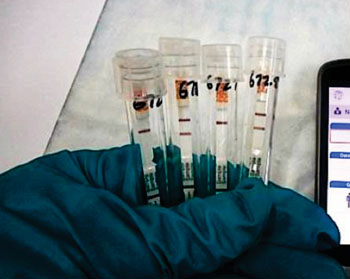Rapid Ebola Test Validated in Field Trials
By LabMedica International staff writers
Posted on 16 Jul 2015
At present, diagnosis of Ebolavirus disease requires transport of venipuncture blood to field biocontainment laboratories for testing by real-time reverse transcription polymerase chain reaction (RT-PCR), resulting in delays that complicate patient care and infection control efforts.Posted on 16 Jul 2015
However, RT-PCR is a slow and complex test that comes with attached risks for the health care workers responsible for the collection, transportation and testing of the blood. The complexity and slow turnaround for this diagnostic have been blamed for delaying success in containing the Ebola epidemic.

Image: The ReEBOV Antigen Rapid Test for Ebola viral infection (Photo courtesy of Corgenix).
An international team led by those at the Boston Children's Hospital (MA. USA) performed a rapid diagnostic test on fingerstick blood samples from 106 individuals with suspected Ebolavirus disease presenting at two clinical centers in Sierra Leone during February 2015. They compared the point-of-care rapid diagnostic test results with clinical real-time RT-PCR results (RealStar Filovirus Screen RT-PCR kit 1·0; altona Diagnostics GmbH; Hamburg, Germany) for venipuncture plasma samples tested in a Public Health England field reference laboratory.
The team also performed the rapid diagnostic ReEBOV Antigen Rapid Test (Corgenix; Broomfield, CO, USA), on whole blood and real-time RT-PCR on plasma, on 284 specimens in the reference laboratory, which were submitted to the laboratory for testing from many clinical sites in Sierra Leone. In point-of-care testing, all 28 patients who tested positive for Ebolavirus disease by RT-PCR were also positive by fingerstick rapid diagnostic test and 71 of 77 patients who tested negative by RT-PCR were also negative by the rapid diagnostic test. In laboratory testing, all 45 specimens that tested positive by RT-PCR were also positive by the rapid diagnostic test, and 214 of 232 specimens that tested negative by RT-PCR were also negative by the rapid diagnostic test.
The authors concluded that the ReEBOV rapid diagnostic test had 100% sensitivity and 92% specificity in both point-of-care and reference laboratory testing in this population. With two independent readers, the test detected all patients who were positive for Ebolavirus by altona real-time RT-PCR; however, this benchmark itself had imperfect sensitivity. The study was published on June 26, 2015, in the journal the Lancet.
Related Links:
Boston Children's Hospital
altona Diagnostics GmbH
Corgenix














